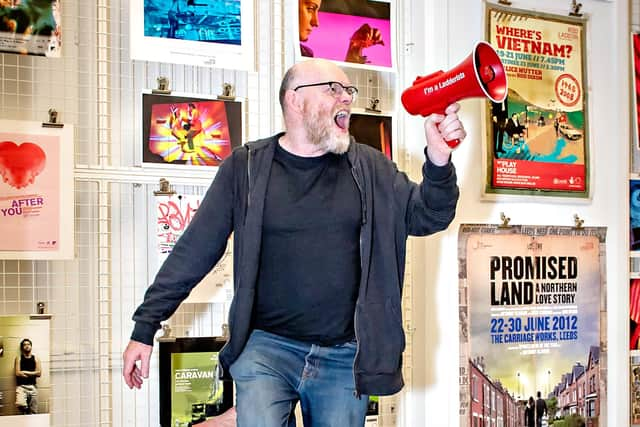How Leeds company’s fighting spirit offers hope for Yorkshire’s embattled theatre industry


We’re living through an historic, defining moment for theatre in this country. When we come out of the other side of the pandemic, theatre in the UK will look different. Some buildings and companies will survive, some won’t. What we look like on the other side of this is up for grabs.
One of the reasons I have some optimism is a little, bolshy company from Leeds called Red Ladder. If the nuclear bomb was ever detonated, you wonder if the survivors would be cockroaches, as the comic books have us believe, and Red Ladder Theatre company.
Advertisement
Hide AdAdvertisement
Hide Ad“This company has survived decades by striving to make theatre which is relevant to its different audiences and in order to stay relevant the company has had to shapeshift constantly,” says artistic director Rod Dixon. “Red Ladder reacts to contemporary events, sometimes by telling stories from past struggles.


This shapeshifting makes defining the company complicated because our focus has shifted across the decades but the common thread has always been to tell stories of struggle in order to empower those in society who suffer injustice or unfairness.”
The shapeshifting in which it specialises is one of the reasons I think of Red Ladder being impervious to more or less anything, even, hopefully, a global pandemic.
While all theatres are facing a fight for their survival in 2020, Red Ladder has been here before. In 2014 the NPO, National Portfolio Organisation, was unsuccessful in bidding for its regular Arts Council funding. To lose NPO status was more than a blow – it was an existential crisis for the company. The company put out an appeal and the supporters – or Ladderistas as they became christened – responded.
Advertisement
Hide AdAdvertisement
Hide Ad“David Peace gifted us the rights to adapt his book The Damned United for the stage. The co-production with Leeds Playhouse was so successful it has gone on to tour the UK and it saved the company,” says Dixon.


The lifeline helped the company tread water and in 2018 Arts Council England accepted Red Ladder back into the national portfolio of regularly funded organisations.
“The success of The Damned United undoubtedly helped. The show is still in demand and is likely to tour again – especially now that Leeds United are back in the Premier League. This show sums up our work – it’s a story which resonates with a lot of people and although a fictional account it touches on many factual moments in many people’s lives.”
Politics have always been at the heart of the company’s work. Formed in 1968 as the Agitprop Street Players, the company emerged when a group from a socialist information service performed a play at the Trafalgar Square Festival of 1968.
Advertisement
Hide AdAdvertisement
Hide AdThe plays were short, biting and morale-boosting sketches and relied on few props to make them highly portable and able to be performed at mass political demonstrations, tenant association meetings and the like. In 1971 a much-loved prop that had seen action at a number of demonstrations gave the company its new name and there evolved a policy of taking theatre to ‘working class’ audiences in places such as trade union clubs.
In 1973 the Arts Council began its official funding of Red Ladder.
“I had known of Red Ladder since my training. The company was discussed as an important influence on 20th Century British Political Theatre,” says Dixon.
“I was running a small theatre in Plymouth and we booked a show produced by Red Ladder but made by The Asian Theatre School, which broke away to become the Bradford company Freedom Studios. It was exciting to know that this famous company was still active when so many similar companies had long since ceased to exist. When the post of artistic director became available I knew that it was a wonderful opportunity to make important, socially relevant theatre.”
Advertisement
Hide AdAdvertisement
Hide AdThe fiery artistic director is one of only two full-time employees who run Red Ladder. “People think we are a larger organisation than we are because of our profile,” he says.
“We are proud to be based in Leeds and grateful that Leeds City Council are generous supporters of the arts. I think the quality of our work helps to give Leeds and West Yorkshire a national presence – so to gain four and five star reviews in national newspapers and publications isn’t a trivial industry pat on the back, it is a bold statement about the north and what a cultural goldmine we live in.
“That partly explains why this small company has attracted artists like Boff Whalley, David Peace, Pauline McLynn, Phill Jupitus, and many others with a national reputation – they know that working with Red Ladder in Leeds compliments anything they have done on larger international stages.”
While it works with impressive names, the company has also, since 2007, run a free actor training course for local people and has staged a number of productions involving a community cast.
Advertisement
Hide AdAdvertisement
Hide Ad“I am confident that Red Ladder’s lean and responsive approach to making theatre will mean we are even more flexible and able to bring theatre to a variety of new spaces. We make high quality theatre that can sit virtually anywhere and some of our shows actually work better in places like social clubs or pub gardens or warehouses.
“Sadly, if some of our theatre buildings do not survive the pandemic Red Ladder’s work could probably continue without those stages – we really hope that isn’t going to happen of course.” To join the Ladderistas visit www.redladder.co.uk
Editor’s note: first and foremost - and rarely have I written down these words with more sincerity - I hope this finds you well.
Almost certainly you are here because you value the quality and the integrity of the journalism produced by The Yorkshire Post’s journalists - almost all of which live alongside you in Yorkshire, spending the wages they earn with Yorkshire businesses - who last year took this title to the industry watchdog’s Most Trusted Newspaper in Britain accolade.
Advertisement
Hide AdAdvertisement
Hide AdAnd that is why I must make an urgent request of you: as advertising revenue declines, your support becomes evermore crucial to the maintenance of the journalistic standards expected of The Yorkshire Post. If you can, safely, please buy a paper or take up a subscription. We want to continue to make you proud of Yorkshire’s National Newspaper but we are going to need your help.
Postal subscription copies can be ordered by calling 0330 4030066 or by emailing [email protected]. Vouchers, to be exchanged at retail sales outlets - our newsagents need you, too - can be subscribed to by contacting subscriptions on 0330 1235950 or by visiting www.localsubsplus.co.uk where you should select The Yorkshire Post from the list of titles available.
If you want to help right now, download our tablet app from the App / Play Stores. Every contribution you make helps to provide this county with the best regional journalism in the country.
Sincerely. Thank you.
James Mitchinson
Editor
Comment Guidelines
National World encourages reader discussion on our stories. User feedback, insights and back-and-forth exchanges add a rich layer of context to reporting. Please review our Community Guidelines before commenting.